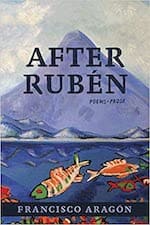With After Rubén, poems and prose, Francisco Aragón has written what I believe is a vital new book for queer and Latinx poetics, in the mariposa tradition. The preposition in the title shapes the book's orientations to Rubén Darío (1867-1916), Nicaraguan poet, known as father of modernismo. Darío, who was closeted in his lifetime, began as a household fixture whose poems Aragón's parents recited through his childhood. The inciting impulse for After Rubén: an archival acquisition in 2012 that included love letters from Darío to the Mexican poet, Amado Nervo. In this book, Darío's voice mixes with Aragón's to confirm, from the grave, the queer nature of his passion and bond with Nervo. Aragón writes, "Looking back, it was personal: I was the son of Nicaraguan immigrants who heard Darío as a child. I was giving myself permission to play with Rubén, my Rubén" (p. 116, ln. 4-6). The collection slow-builds a fire, reaching a sure intimacy through juxtaposition of personal, political, and the poet's turning of the line, his play.
Arranged into five untitled sections (the fifth of which is a nonfiction essay called "My Rubén") and an appendix of ten poems by Rubén Darío in their original Spanish, Aragón's book insists on interconnectedness, making visible the relationships we are born into and the ones we make. Though difficult to neatly delineate the book's sections by time and place, the first one orients us to formative settings (San Francisco and Managua) and family, as well as queer impressions and possibilities flourishing within these networks ("I was a notebook// filled — mamá y papá juntos a different / life billowing inside me" (p. 36, ln. 16-18). The poem "Blister" teases out, in tercets, a story of childhood experience. Details of what occurs between the young speaker and a man who "wore// a white t-shirt, / starched and snug" (p. 37, ln. 18-20) are a bit fuzzy, filtered for me through confusion, entendre, or confusion that I'm imagining entendre where there is none. We nevertheless track an episode that seamlessly weaves in multiple definitions of the title noun: "Don't ask me// how it is I/ ended up/holding it" (p. 38, ln. 9-12), a voice defiant, yet unsure.
The second section layers contemporary political cruelties atop colonization, insisting on endurance, poetry, and prayer in the face of denigration. The settings here range from Notre Dame University in the present day to "Tenochtitlan, 1523," which takes us to the Aztec altepetl two years after Spanish capture. Beginning "while fishing,/ sun lowering itself" (p. 54, ln. 1-2), Aragón's verse in fragments relays observations of what seems like a military takeover and escalating brutalities. The form includes visual caesuras from, perhaps, the composition process, as Aragón's poem is an erasure of Andrés Montoya. The voice speaks amid horrors committed by the Spanish against indigenous people, including the widely fatal spread of infectious disease. Aragón's poem describes an invasion by violent masculinity, ending in an indictment of greed:
so
so so
desire everything
not enough (p. 54 / ln. 18-21)
The repetition of sibilant consonants in those lines reminds me, and maybe only me, of a queer lisp taunting Cortés. Tenochtitlan was a flourishing city atop whose ruins Cortés settled the Spanish capital of Mexico City. It seems we can read the formal qualities of Aragón's erasure in the context of this history of colonization. Here, as elsewhere in the book, Aragón assembles starkly contrasting models of masculinity and desire, suggesting different ways of relating. Through his craft, he offers co-authorship and patience as alternatives to property and conquest.
From the same section, "Academia Escolar," a poem set in "Managua, the '40s," is dedicated to the poet's father. The speaker recalls a moment that could have happened one or one hundred times, in incisive couplets that invoke both César Aira and Herve Guibert. Here, as in "Blister," boy and man narrate alongside each other, from across their lifetime. Yes, somehow it reads as if the speaker is many ages at once, drawing from the full spectrum of immersion and retrospect as the poem unfolds: "Think// about it. A boy./ Afraid of his mother" (p. 70, ln. 20-22).
Intimacies and affections of everyday life are detailed in "To the Old World," a poem from the book's fourth section, which spills out as a single stanza. The poem sweeps me up into a stroll, narrating bygone appreciations as we walk: "Buses in herds rolling by / I stood at the counters of your dirty bars" (p. 94, ln. 8-9). We might be in Darío's Paris here, the city where he shared an apartment for nine months with Nervo. Though written "with Appollonaire and Cendrars," I felt Frank O'Hara in this poem too, which comes as no surprise. Aragón discusses O'Hara's influence as a gay literary hero in "My Rubén," the essay which comprises the book's fifth section. "My Rubén" is an illuminating and heartfelt reflection on Aragón's trajectory as a writer, Darío's role in the mariposa tradition amid revelations of his relationship to Nervo, and why the fullness of passion, however complicated, is crucial for our humanity.
After Rubén is a spacious, energetic collection not only for the poems it collects, but also for the literary spirits it calls into the room. Reading this after months of shelter-in-place isolation, I could have wept for the company Aragón invited me to keep while I was in the world of these poems. After Rubén, for me, was an initiation. A party. A séance. A family album. A musical, even, unfolding in California's Bay Area, Nicaragua, and between. "Dolores Dolores / —it simmers on my tongue" (p. 24, ln. 18-19).
-
Issue 85
-
Editor's Note
-
POETRY
- Hussain Ahmed
- Benjamin Aleshire
- Diannely Antigua
- Amy Bagan
- Theresa Burns
- Robert Carr
- Chen Chen
- Brian Komei Dempster
- Ben Evans
- Ariel Francisco
- Jai Hamid Bashir
- John James
- Luke Johnson
- Matthew Lippman
- Amit Majmudar
- M.L. Martin
- Rose McLarney
- Meggie Monahan
- Stacey Park
- David Roderick
- Annie Schumacher
- Donna Spruijt-Metz
- Noah Stetzer
- Ryann Stevenson
- Svetlana Turetskaya
- Emily Van Kley
-
BOOK REVIEW
- Oliver Baez Bendorf reviews After Rubén
by Francisco Aragón - Deborah Hauser reviews Crack Open/Emergency
by Karen Poppy - David Rigsbee reviews In The Lateness Of The World
by Carolyn Forché
- Oliver Baez Bendorf reviews After Rubén
Issue > Book Review
"Looking Back, It Was Personal": Francisco Aragón's After Rubén
After Rubén
by Francisco Aragón
by Francisco Aragón
160 pages
Red Hen Press
Buy this book through our Amazon.com bookstore and support The Cortland Review.




